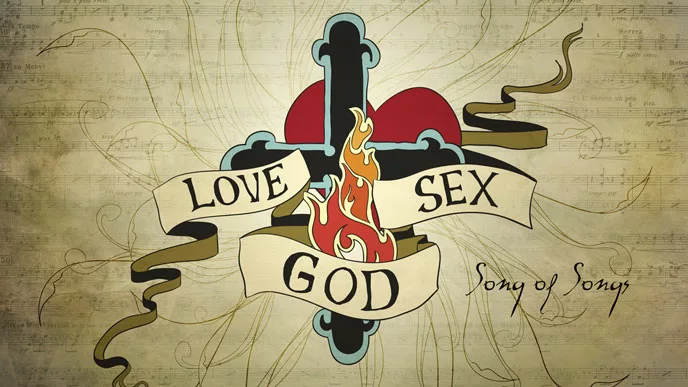The primary focus of the Song is the passion and the desire between the two lovers yet there seem to be something deeper underneath the surface. Rob Bell astutely asserts that: “You can’t talk about sexuality without talking about how we are made. And that will inevitably lead you to who made us. At some point you have to talk about God” (2007: 15) He goes on to say: “Sex. God. They’re connected. And they can’t be separated” (Bell 2007: 15) and then Bell asserts that: “sex is all of the ways we strive to reconnect with our world, with each other, and with God” (2007: 42). If this is true then more can be learned about life, about spirituality and about God through the Song, than merely how to handle our sexuality. John Toy suggests that the erotic is a dimension of God’s love, of Eros. He also suggests that erotic is so much more than sex and that we need to reinstate “eroticism as one of the ways to love God for what he gives us and so to love our neighbours” (Toy, 2007: 331).
It seems clear that the Song has a lot to offer into the biblical dialogue about human sexuality. The Song affirms and praises the physical enjoyment of human sexuality and maybe more importantly, it offers a corrective to the otherwise androcentric world view offered in the biblical texts. Dietrich Bonhoeffer “has suggested that the Song is a superb articulation of ‘creation theology’, for it celebrates the unquestioned ‘goodness’ of creatureliness” (Brueggemann, 2003: 325), it does so by countering the fall if not directly as suggested by 7.10, then implicitly by it’s vivacious celebration of what it is to be a human and a sexual being. By this the Song also offers an important counterbalance to modern societies superficial view of sex, not by condemnation, but by redeeming erotic passion and human sexuality as deeply spiritual and deeply human. It does so without side stepping the difficulty and pain that is also associated with passionate love but by inviting the reader into an imaginative fantasy of risk filled passionate love where the reader may encounter not only what it means to be human but also what it means to be passionately loved by God.
Bibliography
2005 Spiritual formation bible – New revised standard version.
London: Hodder & Stoughton
Beckford, Robert
2008 Theology Beyond iIlusion – Exploring Contextual Theology. Lecture given at the William Booth College, London. 25 June 2008
Bell, Rob
2007 Sex God – Exploring the endless Connections Between Sexuality and Spirituality.
Grand Rapids: Zondervan
Brueggemann, Walter
2003 An Introduction to the Old Testament. Louisville: Westminster John Knox Prss
Eldredge, John
2001 Wild at Heart – Discovering the Secret of a Man’s Soul. Nashville: Nelson
Estes, Daniel J.
2005 Handbook on the Wisdom Books and Psalms. Grand Rapids: Baker Academic
Freed, Edwin D.
2001 The New Testament – A critical introduction. Belmont: Wadsworth
Hess, Richard S.
2005 Song of Songs. Grand Rapids: Baker Academic
Lewis, C.S.
1960 The Four Loves. London: Geoffrey Bles
Murphy, R. & Huwiler, E.
1999 New International Biblical Commentary – Proverbs, Ecclesiastes, Song of Songs.
Carlisle: Pater Noster
Toy, John
2007 ‘God and Eroticism’ in Theology. Vol CX. No. 857 (2007) 323-331
- Sexuality and the Song of Songs – part 1: Background
- Sexuality and the Song of Songs – part 2: Interpretation
- Sexuality in the Song of Songs – Part 3: Symbols
- Sexuality in the Song of Songs – Part 4: Sexual Ethics
- Sexuality in the Song of Songs – Part 5: Conclusion and bibliography







